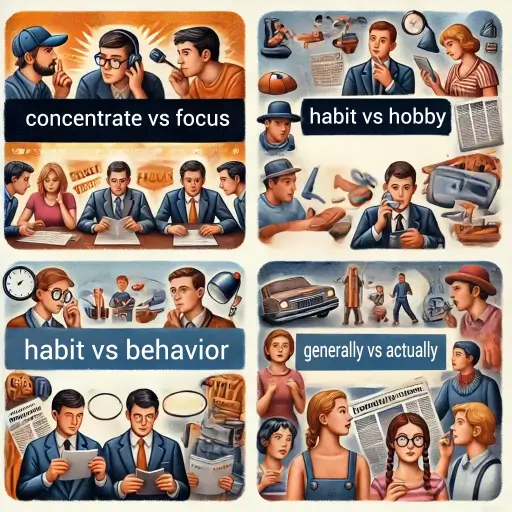"Pronunciation Made Perfect"
"Pronunciation Made Perfect"

[Some links on this site are affiliate links, meaning I may earn a commission if you make a purchase. This comes at no additional cost to you. Thank you for your support!]
Are you often puzzled by the subtle differences between English words that seem interchangeable? You're not alone. Understanding these nuances is crucial for clear and effective communication. In this blog post, we'll explore common English word differences such as "Concentrate vs Focus," "Habit vs Behavior," "Habit vs Hobby," and "Generally vs Actually." By delving into these word pairs, you'll enhance your vocabulary and avoid common pitfalls in everyday conversations and writing. Whether you're a native speaker looking to polish your language skills or an English learner aiming to expand your knowledge, this comprehensive guide will help you master these commonly confused words.
Concentrate: To direct all your mental effort or attention toward a particular activity, subject, or problem intensely, often excluding other distractions.
Focus: To pay particular attention to something or adjust your vision to see something clearly; it can refer to both mental attention and physical adjustments.
Concentrate implies a deep, sustained mental effort over a period of time. It suggests dedicating full mental capacity to a task, often requiring silence or the elimination of distractions.
Focus indicates directing attention toward something, which can be momentary or require less intense effort. It also involves adjusting one's attention or vision to bring something into clarity.
Concentrate is primarily used in contexts where intense mental effort is needed, such as studying, problem-solving, or performing complex tasks.
Focus is more versatile, used in both mental contexts (paying attention) and physical contexts (adjusting a lens or instrument). It often involves bringing something specific into attention after being distracted.
Use "concentrate" when emphasizing intense and sustained mental effort required to perform a task, often necessitating the elimination of distractions.
Use "focus" when referring to directing attention toward something specific or adjusting vision/equipment to achieve clarity, applicable in both mental and physical contexts.
Habit: A habit is a regular action or practice that is performed frequently and often subconsciously. It is an acquired pattern of behavior that becomes almost involuntary through repetition.
Behavior: Behavior refers to the way in which one acts or conducts oneself, especially toward others. It encompasses all actions and reactions of an individual, whether conscious or unconscious, verbal or nonverbal.
Habit is specific to actions that are repeated regularly and have become routine, often performed without much conscious thought.
Behavior is a broad term that includes all actions and mannerisms exhibited by an individual, covering both habitual and non-habitual actions.
Habits are often automatic and may occur without deliberate intention.
Behaviors can be both conscious and unconscious but are generally observable actions in response to a situation or environment.
Habits are often automatic and may occur without deliberate intention.
Behaviors can be more readily adjusted or modified based on social cues, feedback, or personal choice.
Use "habit" to refer to specific actions or routines that are performed regularly and often unconsciously due to repetition./p>
Use "behavior" to describe the overall manner in which a person or animal acts, encompassing all observable actions in various contexts./p>
Hobby: A hobby is an activity done regularly in one's leisure time for pleasure and enjoyment. It is a voluntary pursuit engaged in for relaxation and personal interest outside of one's professional obligations.
Hobbies are intentional activities chosen for enjoyment, relaxation, and personal fulfillment. They are pursued during free time and reflect personal interests and passions.
Hobby is a conscious and voluntary choice; individuals actively decide to engage in hobbies based on what they find enjoyable or fulfilling.
Hobby: is generally associated with positive feelings, satisfaction, and personal enjoyment.
Use "hobby" to describe activities pursued during leisure time for pleasure, relaxation, and personal interest. Hobbies are consciously chosen and are associated with positive emotions and fulfillment.
Understanding the concept of hobby enhances precise communication. Hobbies are leisure activities intentionally undertaken for enjoyment and personal enrichment.
Generally means in most cases; usually. It refers to what is common or typical in a broad sense, indicating that something happens or is true most of the time.
Actually means in fact; really. It is used to express a reality that might be different from what was expected or assumed, often highlighting a contrast or correction.
Generally provides a general understanding without delving into specifics.
Actually often contrasts with what has been previously mentioned or believed, emphasizing the true state of affairs.
Use generally to discuss what is common or usual in most cases. It refers to broad patterns or general truths without focusing on specifics.
Use actually to state a fact or reality, especially when it contradicts previous assumptions or expectations. It emphasizes the truth of a specific situation.
Ready to take your English to the next level?
Thank you for trusting Mr. Practical English as your partner in language learning. Together, we'll make your journey enjoyable and successful!